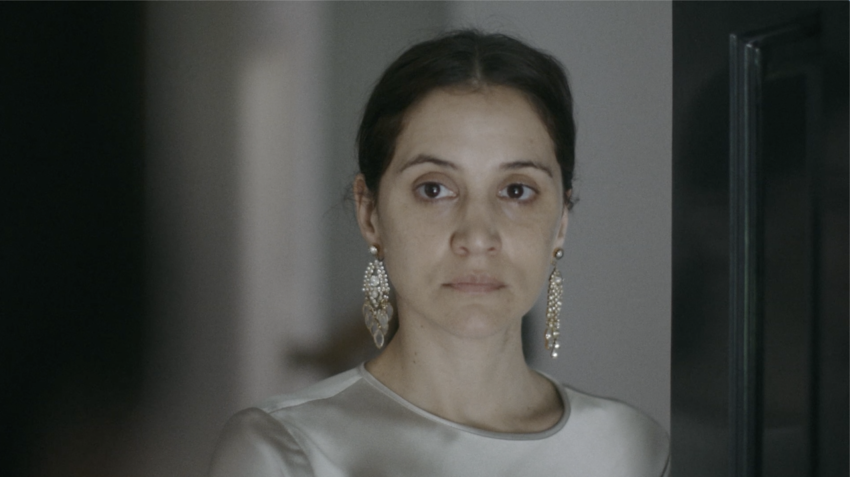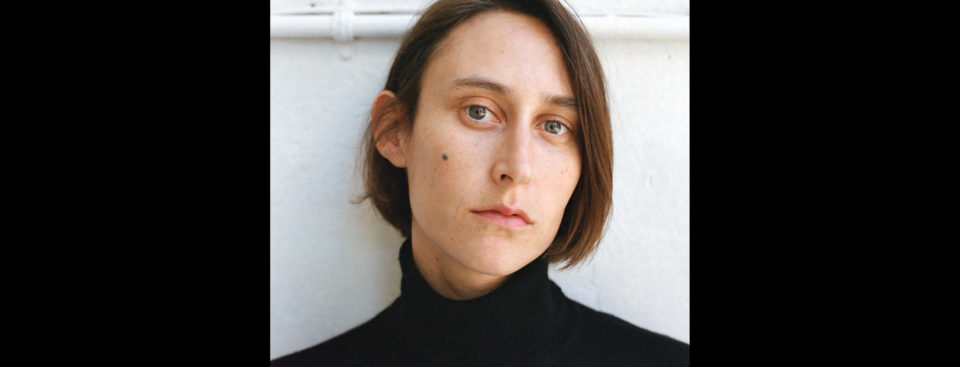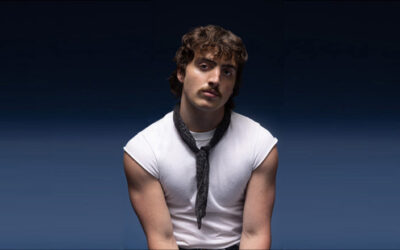
Barbara Lombardo as Manuela.
HOLLYWOOD, CA (LA ELEMENTS) – June 15, 2023 -The opening shot of Manuela, by Argentine filmmaker Clara Cullen, is beautifully choreographed: a flashback of a toddler girl (Alma Farago), incandescent in white, laughing as she leads her caretaker on what appears to be a whimsical chase. However, it’s not until we get towards the end of the movie that we fully understand the desperation that is powering that particular scene.
Desperation is in no short supply in Manuela. It fuels the journey of the title character, played with a steady determination by Bárbara Lombardo. Arriving in Los Angeles from Argentina, we see Manuela’s mounting disappointment as she goes from strip mall to strip mall in downtown LA hoping to land a job. Any job. Her struggle to find employment makes her painfully aware that she is only one among the masses of immigrants who come to the US looking for work.
Manuela’s luck changes when she is hired to by Ellen Lieb (Sophie Buhai) to work as a nanny for her young daughter Alma. Because Ellen’s last nanny had to return to Mexico unexpectedly, Manuela is pretty much guaranteed the job. The fact that she is here only on a tourist visa? Fine. No further questions asked on that topic.
The dynamics between the two women are pretty much what you would expect: a detached politeness. The same cannot be said about the relationship between Alma and Manuela. After losing the woman who had been taking care of her, naturally Alma takes an instant dislike to her replacement. But Manuela is a mother herself and understands. It’s a credit to Cullen’s directing that the relationship between Manuela and Alma takes the time that it takes to blossom. Nothing seems rushed. Nothing seems forced. And when chaos and tragedy strikes, it will be the strength of that relationship that powers the film to its only possible conclusion. One that answers the question : How far would a mother go to protect her child?
Manuela screened at the Los Angeles Latino International Film Festival on June 1 as part of the features program.
We caught up with Clara Cullen shortly before the screening of her film at TCL Chinese Theaters in Hollywood to learn more about the making of Manuela.
I like the way that you opened the movie with a flashback. That always draws the audience in. Throughout the movie, Manuela tells one person she’s from Bolivia, she tells another person….
“She’s from Uruguay. Another person, everything. Argentina. Basically, do you want to know why? Basically, it’s a bit of a joke that she’s making. She’s sort of like looking down at Americans that they don’t really know the difference between the countries.”
So one country is just as good as another?
“Sometimes people will ask me, ‘where are you from?’ And I’m like, “Buenos Aires.” And they’re like, “Oh! Brazil?” Like they have no clue where even Argentina is. A lot of people. Not everyone, of course. Manuela is from Argentina but it’s almost like, she could be from anywhere”.
The U.S. Mexican border has a role in this film.
“The other side of the border. It’s so hard to get into America. It’s so easy to leave.”
It’s right there.
“It’s right there. You know those plants that if you touch them from one side, they are soft. And the other side, they are hard? So basically, I think America is a great place to come work, there are possibilities. Now if you have an emotional problem, if you have a health problem, you cross the border.”
Many Americans do actually cross the border exactly for that reason.
“So if things go bad, like really bad, you get out of here. Because it’s really harsh.”
Living conditions can be really harsh here, is that what you mean?
“I mean, I’m a complete fan of the United States. It gave me everything I have. I’m not blaming the system, but the system is very harsh for people with problems. If you’re sick and you don’t have health insurance, you’re fucked. If you have a problem and you’re heartbroken, nobody is there for you? Do you know what I mean? In Latin America, we are much more civilized emotionally than here. We are the first world of emotions.”
I think more Americans are waking up to the disaster that is the health insurance industry here. I could go on and on, but I won’t.
“I only know the system in Argentina. Health insurance is covered and education is covered and we are a much more poor country. And those places are like the basis of our system so no matter what happens to somebody. Maybe they have to wait but a really good doctor is going to take care of them. Because the best doctors actually work in the hospitals. Some of the time. Then they have their own practice. The best doctors go to the State universities, the state hospitals.”
At one point in your movie, Manuela gets a visit from the ‘Los Angeles Department of Child and Family Services.’ Within the LADCFS system here, there have been some high-profile deaths of children.
“Oh really. I am not aware of that.”
What I was almost thinking was that maybe you did know about that and that’s why in your movie, Manuela does what she does.
“No, I didn’t know. I know that any human being who has a connection with another human being would not let the system take care of that beautiful creature and would actually fight for it. But I am super interested. So what happened?”
There was the death of Gabriel Fernandez who by the way, was the subject of an excellent Netflix documentary. This was a little boy who was removed from the care of his biological mother when he was a baby, but then years later was placed once again in her home, this time with her abusive boyfriend. Long story short, they ended up killing Gabriel. But before that happened, everyone was trying to call LACDFS to report the abuse that Gabriel was suffering. Everyone, his teachers, a security guard at the welfare office. Nothing worked. LACDFS kept Gabriel with his biological mom and her boyfriend.
“The system always works better for people with better zip codes. If you call the police and you’re rich, they’re there in one second.”
So the back story on Manuela is a bit mysterious. I know the mother’s helping her raise her own child. At one point she calls her mother and says, “Did he come back?” Is Manuela referring to her husband?
“Yes. I think on purpose we blurred her past to be able to get a mysterious character. We know she’s running away from something and we know she’s looking for an opportunity. And that’s in a lot of cases the case of people who come here. They are either leaving their country because of something and they’re coming here for an opportunity. And that’s it. That’s all you need. Yes, her mother is taking care of her kid. And yes, her husband left her and was abusive. That’s the part that you don’t know about the story but yes. Sometimes you just don’t need to tell so much. Emotions can tell more than information.”
The character of Ellen Lieb. Her mannerisms are interesting. She’s never rude. She’s very polite, but there’s a kind of detachment in about her. Most of her conversations with her daughter are very superficial, and then towards the end she’s asking her daughter what her favorite food is, she’s trying to engage her by mentioning the dogs in the park, and that was the most that I hear her talking to her daughter. Now was that in response to her daughter’s relationship with Manuela as well as the fact that she has been away?
“Absolutely. I think it’s a crescendo of her guilt of being away. And when you leave a kid for several days with somebody else, the kid gets much more attached to the person who is in front of them than like, the person who just left. They sort of forget you.
I liked the way that you developed the relationship between Manuela and Alma. It was layered. It was really believable which I liked. At one point it’s like they became friends.
“Yeah totally. I mean basically the idea of this film is behind this image that I have. My dad passed away. He used to live in the countryside in Argentina. He was a farmer. And one day I went to see him and I saw a little calf wearing some kind of covering and I thought ‘That’s such a weird strange image. Is he cold or what?’ And he said, ‘No that little calf doesn’t have a mom and the other little calf just died and his mom is looking for him. So, I’m trying for the mom to adopt this new one. Two weeks later I called him and I asked what happened. Yes! She adopted him. Basically, what I’m trying to say with this film is motherhood, blood motherhood, is one way of doing things. But then you touch yourself with other people. And you need other people to help you being a mother. And you can be a mother of different kids who are not yours. It’s more of like an open relationship than that straightforward mom and daughter, mom and son thing that there’s such a big stigma about, you know?”
What directors have inspired you?
Well Agnès Varda was one of my biggest inspirations, this French director. Was she Belgian? It was her birthday two days ago. She died like two years ago. Then Werner Herzog, Lucrecia Martell, Argentine director, Wong Kar-wai, John Cassavetes. So many.
Tell me about the casting process. How did you find your wonderful actors?
Well Bárbara Lombardo who plays Manuela is a very famous actress in Argentina and at that time she used to live here in Los Angeles, and I asked her if she would be up for this role and she said yes. Sophie Buhai plays Ellen and is a friend of mine. She is a jewelry designer actually. But she was an actress growing up to the point that she was reading against Kirsten Dunst for The Virgin Suicides and then Kirsten Dunst got the part. But she was trained as an actress. And then Alma is my daughter.
Alma is your daughter? You directed your daughter?
“I didn’t direct her. She was just playing. We just made the shoot into a playground for her to like come in, do whatever she wanted and then leave.”
In the beginning she doesn’t like Manuela and she shuts the door and tells her she can’t come in.
“That’s true. That was the first day they met, and I showed that scene on purpose.”
Tell me also, what’s your next project?
“I am shooting now a documentary about Michèle Lamy the wife of the famous fashion designer Rick Owens. So that’s why I’m going to Paris on Monday. And then I am developing this series for children that we’re going to shoot hopefully in Argentina or Latin America and we’re doing that with a great production company based in Argentina.”
Manuela (running time: 70 minutes)
Director Clara Cullen
Writer Clara Cullen
Producers Helen Martel Seward, Clara
Cullen and Julia Solomonoff
Cinematography Gillian Garcia
Cast
Barbara Lombardo Manuela
Sophie Buhai Ellen Lieb
Alma Farago Alma
Cover photo of Clara Cullen courtesy of LALIFF
Photo of Barbara Lombardo courtesy of Clara Cullen
Follow LA ELEMENTS on Twitter and Instagram. Like us on Facebook.
For more information on LALIFF, please visit their website.





No Comments